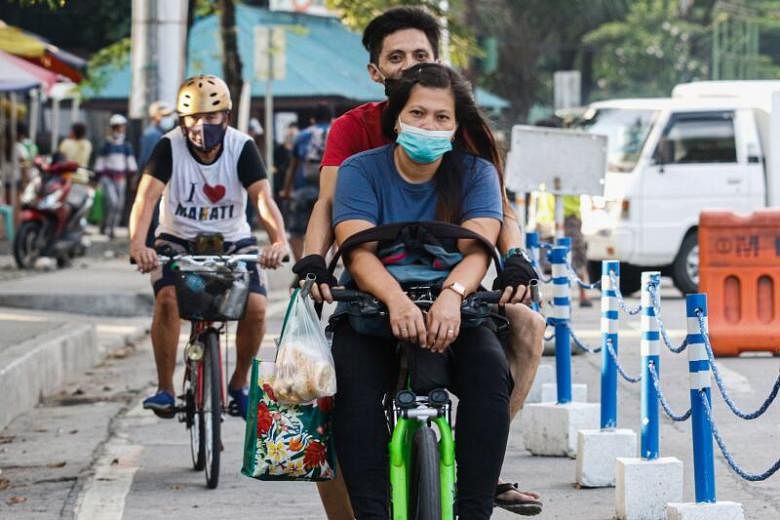MANILA - Current quarantine restrictions in the Philippine capital Manila and five other urban centres will stay till at least October, as the government heeds experts who warn that reopening the country too early may lead to a surge in coronavirus infections by Christmas time.
The rest of the country will be under the less restrictive "modified general community quarantine" (MGCQ), Health Secretary Francisco Duque announced during a meeting late on Monday (Sept 28) with President Rodrigo Duterte.
The Philippines has reported fewer Covid-19 cases so far this month at around 86,000, compared to last month, which saw over 130,000 cases. It still has the highest number of infections in South-east Asia, with a total exceeding 300,000, though active cases are now down to around 49,000.
Data crunchers and health experts at the state-run University of the Philippines said indicators had so far been encouraging.
Just half of hospital beds set aside for Covid-19 patients in the capital are now occupied.
But these numbers still fell short of what was needed for restrictions in Metro Manila - home to some 16 million - to be relaxed further.
Health Undersecretary Maria Rosario Vergeire said on Tuesday (Sept 29) there were still some clusters around the capital that were a source of concern.
"If we can reduce the number of this clustering of cases…, then we can be able to say that we can maybe shift to MGCQ," she told ABS-CBN News Channel.
The experts said while the time it took for infections to double had improved to 13 days from 1.55 in March, it still fell short of the 28 days the government was aiming for before it could further ease restrictions on public transport, work protocols and recreational activities.
"Based on past data and trends, a premature downgrading of the quarantine status may increase the risk of a surge in December, around Christmas time," they warned.
They said at the current rate of infections, and with the existing restrictions in place, Covid-19 cases could still reach 400,000 by year's end.
Trade Secretary Ramon Lopez is pressing for a faster pace of reopening.
"I understand it is not a popular appeal, especially to health workers. But what we are trying to guarantee is, if we keep the enforcement still strict and minimum health standards are in place, I believe we can safely reopen it. It's been six months, and the virus will not go away," he said.
He added that companies that had recently reopened at half their capacity should now be allowed to fully reopen, including hardware stores, clothing shops, bookstores, banks and car showrooms.
Firms that offer professional services, such as legal, advertising, marketing, publishing and entertainment, should also now be operating at 100 per cent, he said.
But Metro Manila's mayors said that would be moving too fast.
"We are seeing a very sharp decline in the number of positive cases. We don't want any shift in quarantine status to affect this decline… We felt that this is not the right time to shift," noted Mr Francis Zamora, one of the mayors.
Most of the Philippines went through one of the world's strictest and longest lockdowns from mid-March to May.
The sweeping lockdown was lifted in June, but that quickly led to a surge in infections that forced Mr Duterte to again enforce a two-week lockdown in August.
That allowed the government to "reboot" its pandemic response, officials said.
Since then, more trains, buses and jeepneys have been allowed to ply their routes. More people have been allowed in malls, churches and other public venues.
Gyms and other sports clubs, internet cafes and salons have reopened.
But the government is still enforcing strict rules on wearing of masks and face shields and social distancing.












